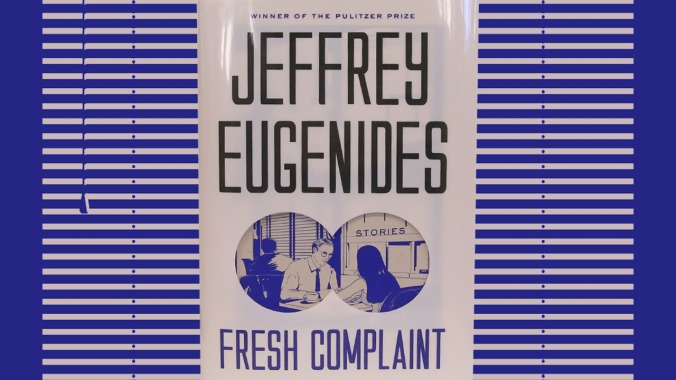Short story criticism is a complicated task. If writers enjoy details and long passages and monologues in their novels, they may choose in their short fiction to be spare and light but no less nimble in execution. Conversely, novelists who favor minimalist prose may decide on larger word counts, and more luxurious detail, in their short stories. Unfortunately, Jeffrey Eugenides is at present completely incapable of conveying just what kind of writer he is, and it’s unclear whether his stories, short or not, have any steam left.
Despite the title Fresh Complaint, the stories within this new short story collection are as stale as airplane cabin air. Three were written after the turn of the millennium, and the remaining five in the previous century. Regardless of their date of birth, these stories belie unconditional lack of respect for characterization, focus, and detail.
Two stories could be folded into the vacuous genre that dominates The New Yorker fiction section: “The smart but depressed married intellectual, plus kids.” Rodney of the story “Early Music” nurses a bottomless passion for the clavichord that outlasts his abbreviated tenure as a musicology Ph.D. at the University Of Chicago. Regarding Rodney and his wife Rebecca: “Their doctoral research led them to the inescapable conclusion that they didn’t want to be doctors of anything.”
If Twitter—home to real disenchanted academics of all stripes and colors and their deep antipathy for their fields of study—didn’t exist, perhaps the tale of Rodney and Rebecca would be more insightful. But the couple has two kids, and what with Rebecca’s “job” as an inventor of Mice N’Warm (stuffed mice you pop in the microwave so they smell of potpourri), the pair is without R&R, hope, sleep, and money for the expensive clavichord Rodney keeps in a pristine room in their apartment. The story is a yawn.
Equally soporific is “Great Experiment,” which follows a similar pattern, except the protagonist, another burdened intellectual (an editor this time, with a wife who has made sacrifices, and their two kids) dabbles in a little white-collar crime by skimming off his boss’s profits. The story doesn’t attain enough scope to be insightful. There’s nothing enlightening or enlightened about Eugenides’ description of this unhappy, underemployed, and underfed former academics demographic.
“Air Mail” is an evident outtake of The Marriage Plot, Eugenides’ third novel. “Find The Bad Guy” is a humorous and reflective reprieve from that book’s endless engagement with grim bourgeois melancholy. The narrator is a Texan radio producer who marries a German woman in need of a green card; by the time, we meet him he’s in violation of the restraining order she has against his unfaithful, possibly alcoholic ass, by creeping closer and closer to the front door of his old house, where his wife and children still live.
“Timeshare” is a sluggish, almost catatonic depiction of pie-in-the-sky retiree parents trying to flip a Florida resort. “Capricious Gardens” is excruciating. The decision to withhold information about the actions and motivations of the four protagonists—two separate sets of friends who meet in the Italian countryside—seems almost personal, as if the writer didn’t wish for us to know anything useful about his characters. In the title story, a professor’s personal and professional life is ruined by a rape allegation by a young Indian-American woman. In his attempt to explore the accuser’s sociocultural background, Eugenides falls victim to a paint-by-numbers narrative style that doesn’t go beyond mere description.
It’s no crime to be a more proficient novelist than a capable short story writer. Middlesex is rightly heralded for its intricacy, warmth, and attention to detail. The Virgin Suicides captivated audiences on page and screen alike for its dreamy, haunting portrait of a family of girls who kill themselves, one by one. But starting with The Marriage Plot, Eugenides has another book to add to the loss column with Fresh Complaint.
Purchasing Fresh Complaint via Amazon helps support The A.V. Club.










![Rob Reiner's son booked for murder amid homicide investigation [Updated]](https://img.pastemagazine.com/wp-content/avuploads/2025/12/15131025/MixCollage-15-Dec-2025-01-10-PM-9121.jpg)

























![HBO teases new Euphoria, Larry David, and much more in 2026 sizzle reel [Updated]](https://img.pastemagazine.com/wp-content/avuploads/2025/12/12100344/MixCollage-12-Dec-2025-09-56-AM-9137.jpg)




